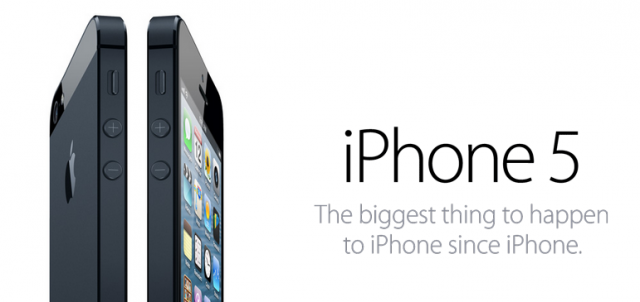
Look, apparently some tech company announced the launch of another phone the other day, and there’s been a lot of noise about it ever since.
You’ve no doubt heard about the iPhone 5 by now. The new one, with the pretty screen, fast wireless (incl. 4G LTE), better battery and the world’s best (so they claim, I don’t necessarily agree) operating system.
Hell, even our partners at WhistleOut have gotten in early and put up [wpb stub=apple-iphone-5-16gb]pages for the iPhone 5[/wpb] if you’d like to get in on the pre-order action. In a nutshell, it seems people are going more than a little bit nuts about all this. I don’t blame them.
If we didn’t have a post on the iPhone 5, you’d ask why, and I found myself asking that question this morning — everyone else is talking about it, why aren’t we? There’s no end of comparison blogs being put up about how the iPhone 5 stands up against existing and rumoured Android hardware. Certainly the top-end phones — Samsung Galaxy S III is one that comes to mind — are having all manner of comparisons drawn.
As a user of both platforms (I know, right? One of the guys behind Ausdroid likes Apple hardware?) I can’t say that I’m not excited about the new iPhone, but not for the reasons you may guess. Chances are I will buy one, yes, but that’s not the end of the story.
I think the single best thing that Apple has done for the mobile phone industry, and I challenge anyone to contradict this thought, is showing people what can be done, and that it can be done well. The iPhone 5 may not be as revolutionary as some devices before it — in fact, it offers nothing particularly exciting that some current Android handsets already have — but it is the continuation of what has been a fairly trend-setting product from the get-go.
I’m looking forward to the continued, upward pressure that Apple (as well as Samsung, Motorola et al) are putting on the market. If Apple had dropped the ball, and released anything less exciting than the iPhone 5, which is certain to gain mass market appeal anyway, then surely the incentive on other manufacturers to present market-leading handsets would drop away a little.
It’s almost as if Apple is drawing a line in the sand, and laying down the challenge: “This is what we’re doing, and a ton of people are going to buy it. If you want to (continue to) take a chunk of the market your way, be mindful that this is the benchmark as we see it. Good luck.”
I don’t think there’s anything remarkable about the iPhone 5. Having LTE, a decent sized screen and good battery life are good things from my perspective, and for a work handset, it’ll no doubt provide a sturdy, reliable platform. In fact, once I get one, I look forward to actually doing an Ausdroid Review ™ of the handset so you can see a (somewhat) unbiased look at what’s so good about it, and what is on the market that challenges the idea of the iPhone as some kind of benchmark.
Apple does some things well, but is it truly a better handset than some of the industry-leading Android handsets? In a few editorials coming up, I hope to spend a bit of time discussing this in more detail, so you can make up your own mind, if you haven’t already.
We are first, foremost, and primarily an Android blog. Everyone knows that. But neither I nor Ausdroid exist in a vacuum — it’s naive in the extreme to think that things that happen in iPhone, Windows Mobile and Blackberry land don’t affect things in Android to varying extents, and where big events like this happen, if we don’t cover it, then I think we’re failing our audience.




